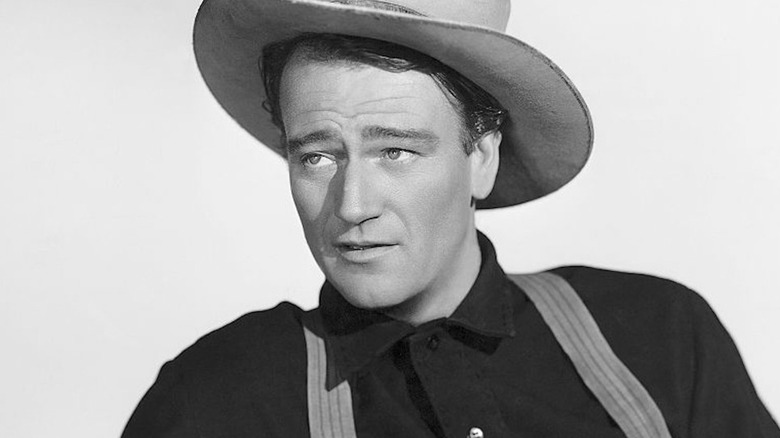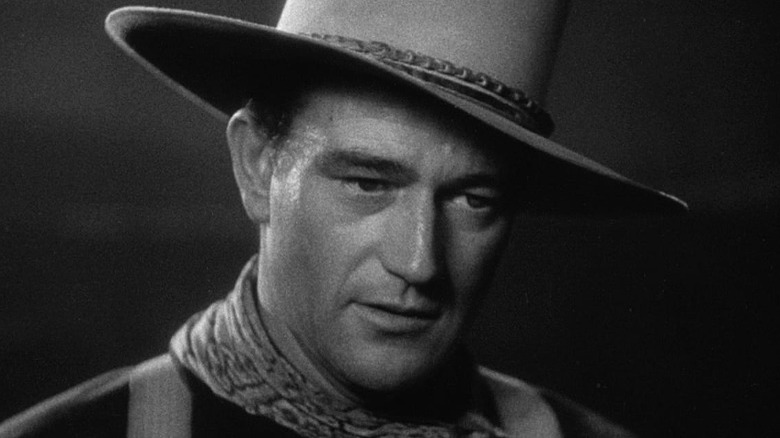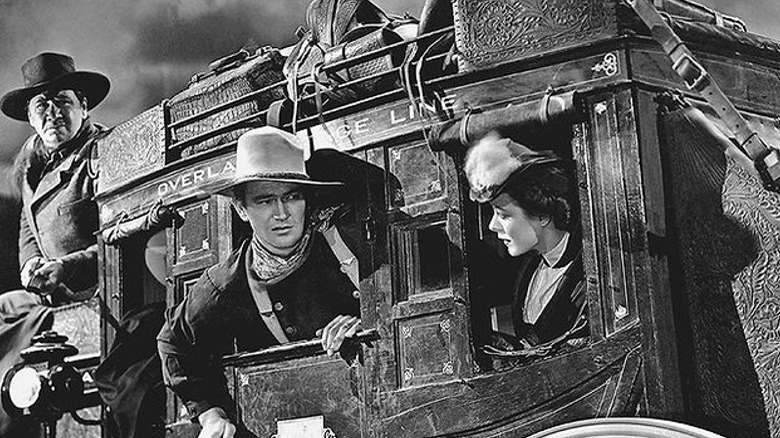John Wayne Started His Career In Show Business By (Literally) Knocking Over John Ford
When it comes to classic collaborations between actors and directors, few can compete with John Ford and John Wayne. The two made movies together for most of their working careers. Even though Ford had a complicated working relationship with Wayne according to most accounts, bullying and belittling him when the cameras were off, they shared a great affection for each other between movies. And at their best, those movies are unbeatable.
Ford had a bit of a reputation for his behavior on sets, coming from his tendency to yell or roughhouse. If Ford could be a bit of a heel on set, a tyrannical bully with a megaphone, he was beloved to many of his longtime actors, the wide-ranging community that became known as the John Ford Stock Company. In many ways, his behavior was probably excused as a lot of masculine ribbing, men ridiculing each other in the tradition of the Navy or farmwork cultures Ford so loved.
There was a reason that John Wayne did his best to save young John Agar from the director's wrath on the set of 1948's "Fort Apache." The actor was a Ford veteran at that point, having gotten his first Hollywood jobs from the director 20 years beforehand. He knew the man's tempers well.
In fact, when he got those first jobs, Wayne had to stand up for himself before John Ford. He was just a USC student on a football scholarship then. When Ford decided to try tackling him, he proved his mettle.
The linemen
Neither John Ford nor John Wayne went by their birth names. They had multiple reasons to adopt show business names, whether it was Ford's desire to not go by his Irish surname of Feeney or Wayne's first name being the decidedly not rugged Marion. Ford's name came from his brother Francis, his older sibling who moved west to make pictures in the early 1900s. Wayne's came from Raoul Walsh, who cast the actor in his doomed cutting-edge proto-widescreen epic "The Big Trail."
Both men also came from the world of American football. According to Joseph McBride's "Searching for John Ford," the director was nicknamed "Bull" Feeney as a student at Portland High School in Maine for his prowess (and brutality) on the field. Even in the fairly unregulated era of the early 1910s, he was notorious for playing rough, and on the rowdy sets of his silent films, lawless football games were rituals. After moving to California, he became a big fan of college football, particularly coach Howard Jones's team at the University of Southern California. Watching those games, he saw Marion Morrison, the man who would be John Wayne.
At that time, Wayne was just a prelaw student and a surprisingly graceful football lineman at USC. He went by "Duke." In the summers, he worked as a prop man on local sets, "lugging around furniture and other props" according to McBride. 1926 saw his first film role ever, as a wild, no-line spectator at a horse race in Ford's Irish drama, "Hangman's House." But their first meeting was a tough one.
The wrath of Ford
John Ford's tendency to belittle and emasculate his male actors didn't start with John Wayne, but Wayne saw perhaps the most brutal edge of it. A lot of it goes back to that first meeting, when Ford saw Wayne working on a set, talked about football some, and delivered what Joseph McBride called "a macho hazing ritual."
John Wayne remembered the incident during his 1976 appearance on "The Phil Donahue Show," talking about how Ford, having played a great deal of football in his life, got Wayne to try to tackle him. As Wayne recalled, "he just kicked my feet out from under me." Wayne was reeling from the typically rough work of Ford, who, per McBride, sneered at the young prop man and sarcastically said, "and you call yourself a football player."
That gave Wayne the push he needed to attempt something on the older man. He didn't have any interest in an acting career at that time, so, no fear for his professional future, he asked Ford to try it again. That time, when Ford came charging, Wayne kicked him in the chest and knocked him over. There was, as Wayne recalled, "a deadly silence."
And then laughter. Wayne proved his mettle to Ford, who was so charmed by his willingness to fight back that he hired him a couple more times through the '20s. He didn't give John Wayne a starring role until a decade later, with 1939's "Stagecoach," which was effectively the star's entry into the big leagues after 10 years of low-budget cowboy flicks.


